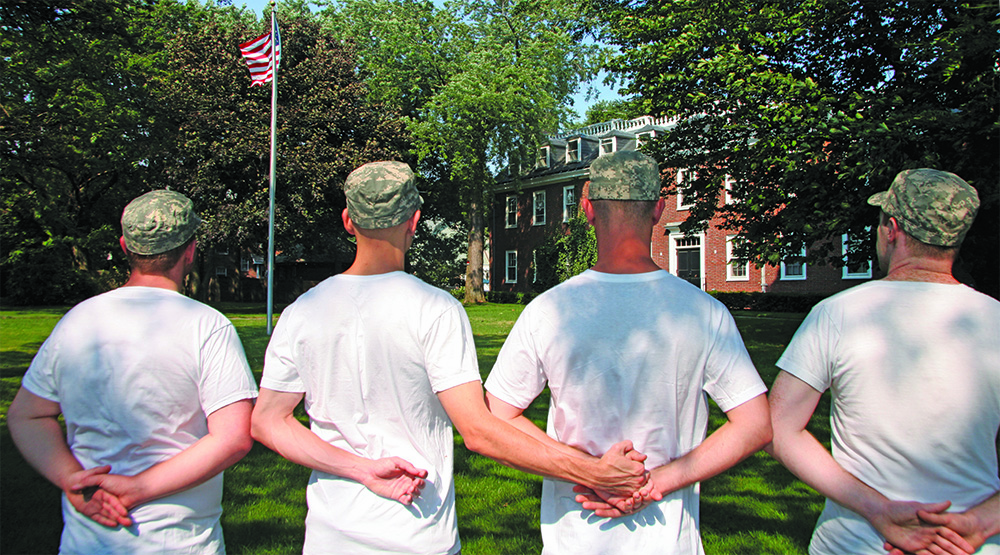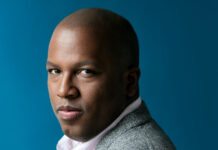How gay soldiers are able and willing to put their lives in the line of fire for a military that won’t let them be who they are
Captain Chris Sterling did a double take early In his tour of duty in Iraq when he noticed Two male Iraqi soldiers walking around the base holding hands. That image revealed how far away from home he really was. A few weeks before Sterling found himself on the front lines of the war in Iraq, he was being questioned at a deployment base in Texas about whom he had listed as a contact in case of emergency.
“Who is this in block 7a?” a senior non-commissioned officer asked. “Is he a relative?”
“No. He’s my roommate,” Sterling answered.
“You need to put down next of kin or at least a relative,” she said.
Sterling explained that he had put down his desired contact.
“You should put your parents down if you aren’t married,” she continued.
“What if my parents were dead and I didn’t have any next of kin?” asked Sterling.
“Is that the case?”
“No.”
The discussion went round like this until the non-commissioned officer finally allowed Sterling to keep the listing, under the condition that Sterling sign a “counseling statement.”
Sterling is gay. His “roommate” is his partner.
“Clearly, had I had the option, I would have checked a box marked ’partner, husband, or even spouse,’” said Sterling, who is from Massachusetts.
But as a gay person serving in the United States Army, Sterling is not legally able to make any statement that would “tell” — as in “Don’t Ask, Don’t Tell” — someone in the army that he is gay.
Sterling wants to continue serving in the armed forces, so he agreed to an interview under a pseudonym.
Later in the same day Sterling’s emergency contact was questioned, he also met with a woman who questioned his last will and testament.
“You want this person named to make all decisions regarding your health care in the event you cannot?” she asked. “This person is also the beneficiary of your property if you were to pass?”
“Yes,” Sterling said, as he prepared for another round of interrogation. But this time was different.
“Generally I don’t recommend you put someone who isn’t family as a beneficiary.
But today there are all kinds of reasons why people wouldn’t put family down. You clearly went through the effort of having it go through a lawyer, notarized and done correctly. So you must be set on your decision.
If you are comfortable with these documents, then so am I.”
Sterling said he wanted to shout out, “I’m a homosexual. Duh, read between the lines!” But instead he told her he was comfortable with the documents.
Gay soldiers experience confrontations like this — some larger, some smaller — on a daily basis. They also experience inconsistent applications of the policy; sometimes it’s easy — “if you are comfortable … then so am I” — sometimes not so easy — sign a counseling statement.
Alex Nicholson, a handsome veteran who served as an army human intelligence collector from 2001 to 2002 and graced the cover the Advocate after gathering dozens of gay and lesbian veterans discharged under Don’t Ask, Don’t tell for an educational tour called “Call of Duty,” says that one of the primary problems with the policy is its erratic enforcement.
“For example, commanders can tell you they have accusations of homosexual conduct and will give you two options. The first is an intrusive investigation where you can face a less-than-honorable discharge, or the second, you can go quietly and have an honorable discharge.”
Nicholson adds that there are few, if any, repercussions for commanders if they do “ask,” whereas an anonymous accusation of homosexuality can be grounds for a prolonged investigation, and can lead to a soldier’s dishonorable discharge.
All it takes is one soldier with a grudge against another to get the ball rolling, according to Elizabeth Quillian, a 38-yearold veteran from Miami, Florida.
In her case, a male colleague joked to his cohorts that he would be able to bed Quillian within one week’s time. When he failed in his attempt, he made a case to her superior that Quillian was a lesbian.
Consequently, Quillian faced the prospect of a protracted inquiry. Fortunately for Quillian, when all was said and done, her commanding officer “told that clown to go pack sand,” says Quillian.
But the situation brought home for her the deep sense of hypocrisy embedded in the policy, a policy which, she says, violates the Cadet Honor Code, which states that “a cadet will not lie, cheat, steal or tolerate those who do.”
“The policy forces cadets to lie,” says Quillian, who retired from the navy in 2006 after 20 years managing a team of 25 in the area of combat electronics. “But more importantly, at the cadet level, you are young, and don’t know what preference is. So when people start serving, they are not necessarily lying, but they are not being honest about themselves and others.”
Sterling encountered one such young cadet who decided to just come out of the closet and get out of the army altogether. Sterling, ironically, headed the investigation.
“I tried to give him every indication that there were others like him in the military, and that it was okay, without outing myself,” says Sterling, “but ultimately he wanted to leave the military.”
Beyond discharge threats, there are more subtle ways that the Don’t Ask, Don’t Tell policy preys upon its gay and lesbian soldiers.
For instance, Team Ramrod and Team Brokeback were the names given to two army units being deployed to Iraq, according to Captain Sterling. The names themselves provided fodder for a great deal of unadulterated homophobic behavior.
“That gay shit just ain’t natural,” Sterling remembers one soldier saying during a conversation after seeing gay content on the news. “I mean, it doesn’t just happen over night without practice.”
Sterling was amazed, comically reflected to himself about how much he had “practiced” at being gay.
When a television program was airing a preview of “Brokeback Mountain,” Sterling recalls another soldier griping, “Jesus Christ, I’m trying to have some damn breakfast. I don’t want to watch no queer movie.”
Most gay soldiers, like Sterling, just let these remarks roll off their backs without comment.
But it doesn’t have to be that way.
Hope For Changing the Policy
There is hope that Don’t Ask, Don’t Tell will be overturned soon and that gay and lesbian soldiers, like Sterling, Nicholson and Quillian, will be able to serve openly.
Congressional support for the Military Readiness Enhancement Act, which would repeal Don’t Ask, Don’t Tell, has grown to 127 co-sponsors in the House of Representatives.
And a poll by Pew Research in 2006 found that 60 percent of Americans favored having gay people serve openly in the military, up from 52 percent in 1994, when the survey was first conducted.
While Congress and public opinion take aim at the policy, Don’t Ask, Don’t Tell is also being challenged in the courts in three separate lawsuits, one by the American Civil Liberties Union (ACLU), another by The Servicemembers Legal Defense Network, and a third, which Nicholson is a party to, by the Log Cabin Republicans.
The Servicemembers Legal Defense Network estimated that in 2004 65,000, or 2.8 percent, gay and lesbian military personnel were serving in the United States Armed Forces, on active duty, in the reserves and with the National Guard. They also note that at least 55 Arab and nine Farsi linguists — jobs in high demand with a military focused on the Middle East — were expelled under Don’t Ask, Don’t Tell.
Twenty-five countries already allow gay and lesbian patriots full-fledged military participation.
The United Kingdom opened its doors to gay and lesbian soldiers in 2000 after the European Court of Human Rights ruled the ban there illegal.
“It’s a non-issue in England,” says Quillian. “There have been no reports of massive comings out. Gays and lesbians still have to abide by a code of conduct, which is all-inclusive and goes across the board. Just because the ban in the U.S. may someday be lifted doesn’t mean there’ll be an all out orgy.”
Recent polling supports Quillian’s claim.
“Nearly three in four troops (73 percent) say they are personally comfortable in the presence of gays and lesbians,” according a Zogby report released in December 2006.
“Of the 20 percent who said they are uncomfortable around gays and lesbians, only 5 percent are ’very’ uncomfortable, while 15 percent are ’somewhat’ uncomfortable.”
Ultimately, there is little hope that the executive branch under George W. Bush will push for any real change on the issue.
But in a recent Democratic primary debate, all eight Democratic candidates voted in favor to repeal the ban. In contrast, all eleven Republican candidates voted in favor to keep the ban.
Being Out Without Telling
Despite the closeted atmosphere for gay soldiers in the U.S. army, many of them find ways to socialize with each other, according to Iraq War veteran Brian Fricke, who served in Iraq from 2004 and 2005.
But it was in 2003, while serving in Asia, that Fricke first found other gay people in the service.
“When I arrived in Okinawa, Japan therewas an underground group of gay and lesbian soldiers that I fell into; it was very much a members only club,” said Fricke, who resides in New York City and honorably finished service in July of 2005.
This underground community can be critically important, says Fricke, because other resources that promise confidentiality — mostly clergy and mental health professionals —aren’t reliable.
Fricke said he heard one too many horror stories of chaplains and therapists outing gay men and lesbians to their commanding officers, effectively curtailing their length of service and setting them up for dishonorable discharges.
Consequently he decided not to reenlist.
He currently works for the government as an information technology specialist in Washington, D.C.
Sterling also first tapped into a huge under-ground gay community in the American military overseas in Korea.
“Once you break into that community, you learn how to take care of each other,” Sterling said, adding “there are two gay bars in Seoul that are both for gay American military soldiers.”
In Iraq, Sterling was not able to be as adventurous. As part of an elite 10-man squad working with Iraqi security forces, he could never leave his base without being accompanied by at least one other squad member. So he kept his homosexuality a secret, keeping in touch with his partner and other gay friends in the states via email and instant messaging services.
Sterling says he was surprised when an Iraqi lieutenant struck up a friendship with him. After a stressful patrol day when several improvised explosive devices exploded, disabling vehicles and rattling nerves, the lieutenant was waiting for Sterling back at the base. When the lieutenant saw Sterling, he put aside his assault rifle, looked up at the sky, then back at Sterling. He walked up to Sterling and said, in his native language, “Allah has brought my American brother back safely. All praise Allah.” Then the lieutenant gave him a warm embrace.
Sterling recalls feeling uncomfortable with the affection, but was grateful for it later.
“The nice part is that we were embedded with Iraqis,” said Sterling, “and the cultural exchange was quite rich. They are not all religious fanatics.”
Deep friendships and male bonding also occur between gay and straight American soldiers, and that can open up another tricky can of worms for gay service members under Don’t Ask, Don’t Tell.
Sterling recalls running into an old army friend while in Kuwait for training. They caught up, as old friends do. Sterling’s friend was now married with a baby.
Sterling explained that he had a family with two children. But the lack of pronouns, and the fact that the children weren’t biologically his, started to make the conversation very awkward.
So Sterling finally said, “Look, you know I’m not a traditional kind of guy. There won’t be any big wedding with a bride in white.”
“I know, but I don’t know,” said his friend with a confused look on his face.
“You know,” stated Sterling. “You can’t ask and I won’t tell, but you know. Do we need to go any further?” His friend was satisfied and the conversation took a relieved turn as they shared coffee for another hour.
And despite the secrecy of Don’t Ask, Don’t Tell today, some same-sex love stories are sprouting from the army.
One of the more sentimental aspects of Sergeant Fricke’s story is the melding of two hearts in the navy culture of Southern California. Re-stationed in San Diego for eight months, Fricke reconnected with Brad Catoe, a military brat two years his junior, who he had met through mutual friends. They started dating and have been together ever since. At first, Catoe’s father, Commander Catoe, a navy officer in San Diego, was skeptical, but soon warmed up to Fricke.
“Opinions do change, and the common joke was that his parents grew to like me more than they liked his son,” said Fricke.
In February of 2004, when Fricke was deployed to Iraq, Catoe and family regularly sent care packages.
In April of 2004, after mortar attacks killed one of his service mates, Fricke came to terms with the fragility of life and decided to come out once and for all – via email — to his own parents and to dozens of people that knew him since childhood.
“I still remember thinking how shocked I was that I clicked the ’send’ button,” said Fricke. “My parents replied to all saying that they loved me, but that they didn’t support my lifestyle choice. There were 30 emails sent back and forth between Iraq and the U.S., some people defending me, and others supporting my parents. It made me realize how close-minded Middle America can be. Here I am putting my life on the line for their right to have freedom of speech and they won’t even allow me to do that.”
Why Gay Soldiers Still Serve
With this kind of animosity, why do these gay soldiers continue to serve, particularly when some of them don’t even support the war in Iraq? “Are you going to play the homosexual card to get out of it?” one friend of Sterling’s asked, when Sterling first discovered he was being called to active duty in Iraq.
It’s not that the thought didn’t cross his mind. He was in the reserves at the time, with a great partner, and he was getting ready for a career change. He was very happy with his life at the time.
But the answer to his friend came blurting out, “Absolutely not. Gay people are defined as being people who can’t serve in the military. What better example can I give, than as a quiet example of what we truly can be. If I play the homosexual card, I allow every negative homosexual stereotype to be perpetuated.”
Fricke concurs with Sterling.
“What I say to young gay men and women who want to serve their country is: Go for it; know your risks and follow your heart,” says Fricke. “If we stop serving, we undermine our own struggle.”
Sterling recounts an episode that illustrates his even deeper reasons for serving. After a particularly stressful day, when American and Iraqi troops he worked with were being heavily hit with improvised explosive devices by Iraqi insurgents, Sterling’ lieutenant friend gave Sterling’s a big hug and kissed him four times on the side of his face.
“You are my best American friend. You and the other Americans have given us a dream. Do not be angry at Iraq today,” he said in English. “Those actions are not in our hearts. You are.”
When the lieutenant took Sterling’s arm and grabbed his hand to walk together, Sterling tightened up. One of the translators noticed and came over and told Sterling, “Relax.
He is not gay. If he were gay, he would not be openly affectionate to you. He would not put it out in public as he would be killed.”
Sterling reflected to himself that his life had been in danger, and one man was expressing his gratitude toward him through some affection. Why shouldn’t he simply accept it? After that day, Sterling began greeting the lieutenant with embraces and kisses.
“After all,” says Sterling. “Isn’t that why we serve?”









